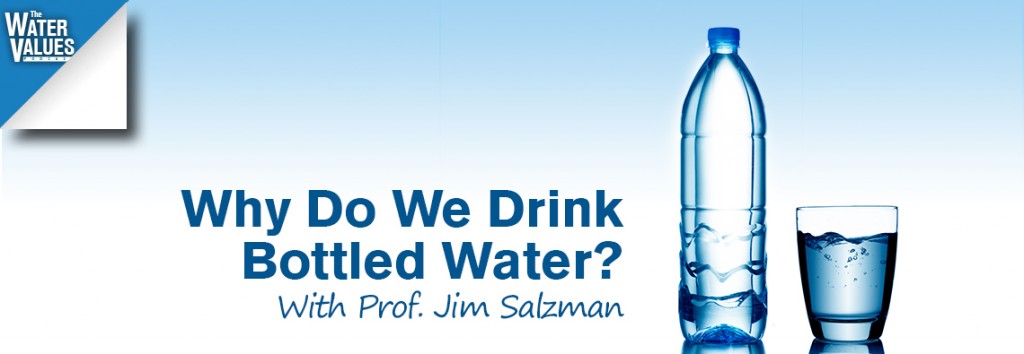Podcast: Play in new window | Download
Subscribe: iTunes | Android | RSS
The sixth session of The Water Values Podcast welcomes Duke University professor Jim Salzman. Jim wrote a book titled Drinking Water: A History, in which he follows the history of water from a number of differing perspectives. In our talk, Jim addresses several of those issues and focuses on the rise of bottled water and two ongoing debates – drinking water as a commodity versus drinking water as a human right, and drinking water in the developing world provided by grey infrastructure versus drinking water provided by point of use treatment. You will learn a lot by listening to Professor Salzman.
In this Session, You’ll Learn about:
- How water came to be bottled in the first place
- Early American bottled water’s medicinal roots
- What caused the American bottled water market to crash in the early 20th century
- The European conception of bottled water and the vastly different American view of bottled water
- How bottled water found a renaissance in the United States
- Bottled water versus tap water regulation
- The different tastes of bottled water
- Where bottled water comes from
- The commodification of water and the argument for the private sector supplying drinking water
- Water as a human right and the argument for government supplying drinking water
- The debate over how best to provide safe drinking water to the developing world
- What the future use of water holds for us
Resources and Links Mentioned in this Session Include:
- Amazon link for Drinking Water: A History
- Amazon link for Bottlemania
- Peter Gleick’s Bottled and Sold
- Vichy bottled water:
- Badoit bottled water
- Perrier bottled water
- Baden-Baden spring water
- Dasani bottled water
- Aquafina bottled water
- Poland Spring bottled water
- Professor Salzman’s drinking water history site
- H2ORadio.org
Transcript
Click here to download the Transcript for Session 6 of The Water Values Podcast
Thank You!
Your support and enthusiasm for The Water Values Podcast continues to amaze me. Thank you so much – keep the emails coming and please rate and review The Water Values Podcast on iTunes if you haven’t done so already.



Pingback: McCord Consulting Group | Water Water Everywhere!
Salzman’s description of McCloud was a little too general and slightly biased.
(1) Local leaders signed a contract with Nestle, to divert about 10% of the snow runoff into bottling. The deal was rejected because (a) the price was too low and (b) lots of people worried about environmental impacts (trucks WERE a big concern)
(2) It wasn’t about draining an aquifer, although those problems have crept up before; it wasn’t about “millions of gallons” as the diversions were moderate; and it wasn’t about “who the water belonged to, as that was clear in the contract.
More: https://www.google.com/search?q=mccloud+site%3Aaguanomics.com